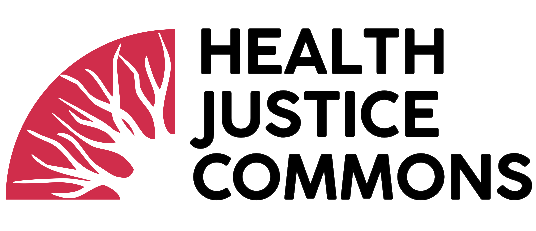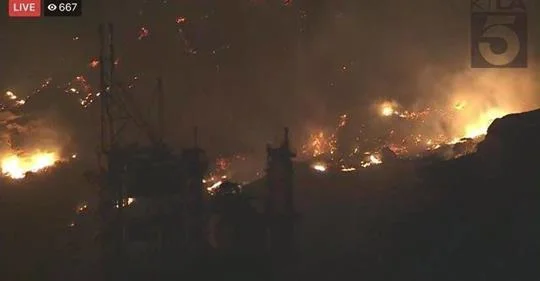Climate Chaos and Taking Action
[Image Description: This photo has a dark background with two clusters of fire and smoke throughout the image. In the lower left-hand side of the image is a piece of infrastructure. In the upper right-hand corner is a “5” outlined by a black background. ]
Climate Chaos and taking action at the intersections of health, disability, and climate justice.
On the morning of November 9th, 2018, Paradise, CA was razed by climate fires. Wildfires continued to blaze across both northerns and southern California for nearly the rest of the month, finally reaching near containment when rains came on November 21st. During this period, the Bay Area's air quality was measured to be the worst on the planet for two consecutive days and the PM 2.5 levels soared into the red and purple zones for over 2 weeks.
The Woolsey Fire in LA began in a poorly contained nuclear waste site, unleashing unpredictably dangerous toxins into our ecosystems and bodies. This posed such an extreme threat that Physicians for Social Responsibility issued an emergency advisory that was largely ignored by mainstream media. The fires also unleashed approximately 3,000 other toxins used in daily living from flame retardants to plastics. Many of the substances that caused our our throats to burn, our heads to ache, nausea and breathing difficulty are things we look upon in our daily lives as harmless. But, according to a UC Davis Study from February 2018, industrial and consumer products have overtaken transportation as a source of urban air pollution. The study states that over 50% of air pollution ‘smog’ is caused by personal hygiene products and industrial cleaners – everything from one’s hairspray, styling gel, and deodorant, to cleaning agents like bleach or windex and neighborhood dry cleaners and laundromats. These also burned.
When we identify which toxins we must prevent from pervading our bodies, ecosystems, and daily lives, we wisely and increasingly look towards pesticides or the harmful chemicals from fossil fuels.
In 2018, we made strong strides in challenging big polluters like Monsanto. A jury recently mandated it pay $289 million to Dewayne Johnson because its herbicide glyphosate (round-up) caused his life-threatening cancer. In early 2019, Costco removed glyphosate from its shelves and NYC announced its plan to divest $5 billion from fossil fuels, and to sue big polluter's for the consequences of climate change.
However, we have yet to begin to reckon with the exceedingly high amounts of toxic substances we interact with daily because we have so thoroughly normalized their presence. This has caused us to overlook the powerful and collective opportunity to leverage of power of choice and good sense to make our homes, work places and communities safer, healthier, and more environmentally sustainable simply by transitioning to chemical-free cleaning and personal care products.
For many of us, some of these products may be cost-prohibitive, but green collectives and coops already exist to make these products more accessible. Without too much effort we could organize our places of work and communities to make use of them and transition to greener living. In these times of climate chaos – when wildfires, hurricanes, increasing asthma rates and the risk of a cancer diagnosis face 1 in 3 people in the US – force us to confront the real costs of the toxicity of human society, we need to begin to take action decisively and on multiple levels. Please see links below for resources and to take action.
https://aqrc.ucdavis.edu/news/consumer-industrial-products-overtake-transportation-source-urban-air-pollution?fbclid=IwAR3hBKd3sv977lOc1YAYDnXvZdgiI91VhrOIJG9z_jym9tooCOlXNsF1L3o

